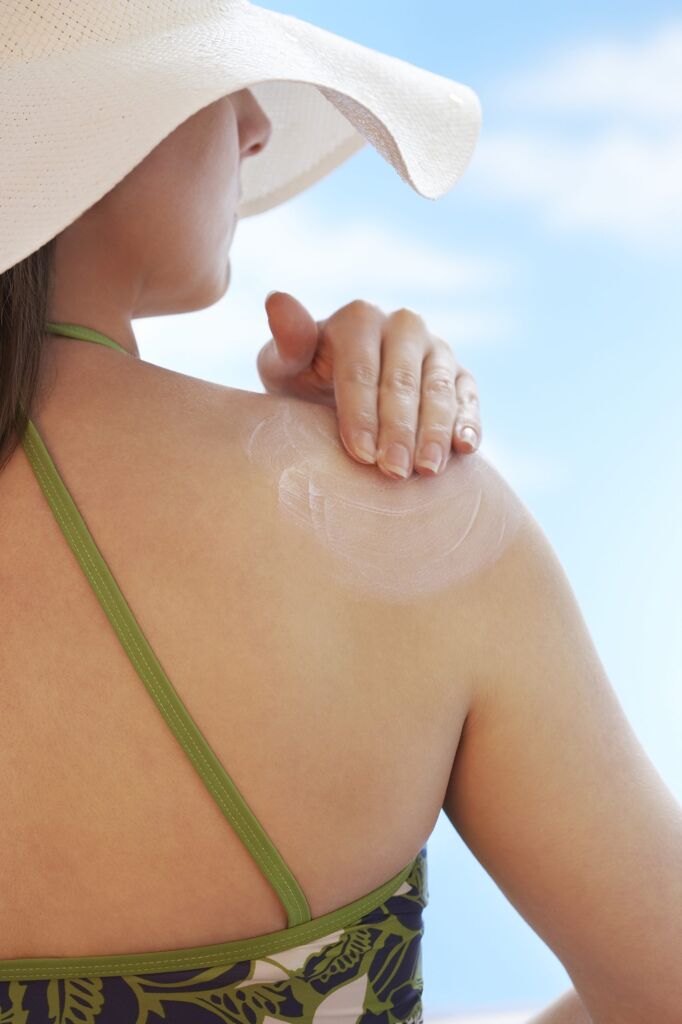Is Sunscreen Damaging Your Skin?

Now that summer is (finally!) here, we know you’ll be spending more time in the sun. And that’s not a bad thing; we are hardwired to love the sun! Exposure to the sun causes us to release endorphins, creates vitamin D and even regulates our sleep cycle. But it’s important to enjoy the sun in a healthy way that decreases our chances of developing skin cancer and aging prematurely. Most people think sunscreen is protecting them, but is sunscreen damaging your skin?
So how do you enjoy the benefits of the sun without compromising the health of your skin? You just have to know what sunscreens and topical ingredients to use, which foods to emphasize and the antioxidant supplements you can take for extra support.
Let’s start by talking about why the type of sunscreen you buy makes a big difference. If you’re someone who slathers drug store sunscreen every time you leave the house, you’re going to want to keep reading!
To Read About Blog Topic, Scroll Down
Want To Work With Our Clinic?
Do you have a chronic or mystery illness that no one has been able to help you with? Are you simply wanting to re-connect with a healthier version of yourself? It’s Time To Finally Feel Better!
What’s hiding in that conventional sunscreen?
Conventional sunscreens that you might buy at a regular grocery store or drug store filter UVB rays with chemical additives like oxybenzone, avobenzone, octisalate, octocrylene, homosalate and octinoxate. Studies have shown that these chemicals are unstable and can create reactive oxygen species when exposed to UV rays. What this ultimately means for you is that these chemical sunscreens are creating more damage to the skin when exposed to the sun than if you weren’t wearing any sunscreen at all (2)! In addition to their potential to damage skin, chemical sunscreens can also trigger allergic reactions.
These chemical additives are also absorbed through the skin and studies have shown they are found concentrated in the urine in significant quantities (3, 4). These chemicals are known endocrine disruptors, exerting an effect on thyroid and other endocrine gland function. Common sunscreen additive BP-3 has been shown to have a strong effect on both testosterone and estrogen levels in the body (5). This means that chemical additives in sunscreens are not only being absorbed through the skin, they are also affecting hormone levels and the function of the glands that regulate hormone balance.
Environmental effects
Despite increasing public awareness, many people are still not aware of the devastating effects chemical sunscreens can have on the environment. Since municipal water filtration systems can’t remove these additives, they are able to enter rivers and oceans where they cause significant damage to marine life.
Areas of heavy recreational use are especially susceptible to accumulation of chemical additives from sunscreens. There are also numerous studies that show how harmful these additives are to coral reefs. One study published in Ecotoxicology showed that sunscreen additive BP-2, caused damage and bleaching of coral reefs (6). Another study concluded that even in extremely low concentrations, chemical sunscreens cause rapid bleaching of coral (7).
An alternative to chemical sunscreens
Chemical sunscreens are clearly not an ideal choice for those of us who are concerned for both our own health and the health of the environment. At the same time, sunscreen does offer protection from skin cancer. Fortunately for those who want the benefit of sun protection without chemicals, there are some great natural sunscreens available. These use minerals to provide a physical barrier from the sun. The two ingredients that fall into this category are zinc oxide and titanium dioxide.
The ingredients in mineral sunscreens are both safe for us and the environment and offer effective protection from UVB rays. One caveat here is that these ingredients, when in nanoparticle form can penetrate the skin and potentially create free radical damage (8). It is important to look for a natural sunscreen with “non-nanoparticle” zinc oxide or titanium dioxide. This means the particles are too large to be absorbed through the skin. You can see a comprehensive list of the best mineral sunscreens on the Environmental Working Group Website.
We encourage you to take the simple step of reducing your exposure to toxins by removing all chemical sunscreens from your home and swapping them out for a non-nanoparticle mineral sunscreen. Keep in mind; some mineral sunscreens go on white so you may have to try a few until you find the one that works best for you. Putting on lotion before applying sunscreen can also help it go on a bit more transparently and evenly.
Want help with your health? Book a free health evaluation call to see if you are a good fit for our clinic by clicking the button on the left below. If you are a clinician interested in advancing your training, please check out our online worldwide functional medicine training institute by clicking the button on the right below.
Book My Free Phone Health Evaluation Functional Medicine Certification for Clinicians
Are You Suffering From A Chronic Illness?
Does your current health situation look like this…
- Do you feel that you have tried many things and either nothing works, or the treatment does not hold?
- Have you been told that there is nothing that can be done to reverse your illness and you just need to manage symptoms?
- Does your illness impact your work, your family, your happiness and your social life?
We specialize in finding answers and solutions for complicated chronic illness when people feel like they have tried everything. If this sounds like you, book a free call with us to see if we are the right fit for your health goals.
Dr. Miles has spoken for the following organizations:


















Responses